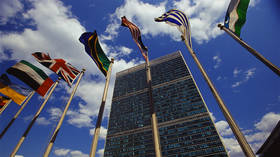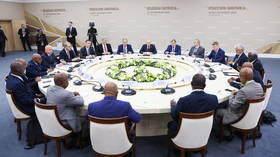Timofey Bordachev: Here’s why building a new world order to break Western hegemony won’t be an easy task
Even if Russia succeeds in Ukraine, it would be somewhat naive to expect our adversaries to change their view of the world

The axiom of Western foreign policy logic is the fundamental impossibility of a just international order. This conclusion was not drawn by our adversaries out of thin air, and not simply out of a desire to provide an ideological basis for a world order that serves only their interests. It has emerged in the course of the historical process, on the basis of the huge experience of the history of inter-state relations in Europe – perhaps the richest if we are talking about such a geographically localized part of humanity. Several millennia of tumultuous social interaction and inter-state clashes have formed the basis of the political culture of the powers with which Russia has historically been in a state of confrontation.
The reason for this entrenched injustice, as all Western science and civilization assures us, is that the balance of power between states is linked to objective factors of a geopolitical nature and will therefore always remain the cause of its inequality. It is impossible to solve this problem, and at best we can talk about reducing its negative impact on global security. This logic seems quite reasonable. Especially since the middle of the last century, it has been reinforced by the factor of nuclear weapons, the possession of huge arsenals of which puts some powers in an inherently superior position. Now international politics is entering a new phase of development, but the nuclear factor remains central to the survival of the great powers.
Moreover, the last 500 years of world political history have indeed been marked by the total power dominance of the West. This has allowed its leading powers to shape the basis of international law and the rules of the game, which since the mid-19th century have been imposed on the entire world. As Henry Kissinger, who recently celebrated his 100th birthday, has noted: “The genius of the Westphalian system and the reason it spread across the world was that its provisions were procedural, not substantive.”
So, the modern international order is based on a procedure created by the countries of the West, and the central idea underlying this procedure is the inherent injustice of international politics.
The creation of numerous international institutions in the last century has not changed anything in this respect. As is well known, they were also created on the basis of the balance of power between states and, in this sense, had no effect whatsoever on the continuation of the policy of arbitrariness pursued in past centuries by the strong against the weak. Nor does the UN, which we love because of the exclusive formal rights granted to Russia, represent a revolutionary solution that would remove injustice from world politics. In its present form, it is the product of Western intellectual endeavor, which has allowed it to maintain its dominance even as Russia has emerged from the Second World War and after the re-emergence of China. As for all other relatively large international organizations, they are tools in the hands of those with the most serious power capabilities.
Under these conditions, the rest of the international community is faced with a difficult choice, which in part even dictates its behavior. Since the injustice of the world order is axiomatic from the West’s point of view, the struggle of the rest to extend their rights becomes a challenge to the natural order of things. In other words, if Russia, China or anyone else in the world does not accept the monopoly of the strongest, then for the West and for thinkers around the world who think in this frame of reference, it is a confrontation with the very nature of international relations. And those who have the dominant power for the time being naturally seek to protect the world order, which is natural in its injustice. Creating an alternative arrangement is therefore not just a technical but a philosophical task, which is much more difficult to solve than defeating the West in yet another tactical clash. Even if Russia succeeds in Ukraine, it would be somewhat naive to expect our adversaries to change their worldview, as this would be tantamount to demanding a change in their philosophy of life.
Russia has traditionally had a complex relationship with the Western power-based international order. Since the first contacts between the Russian state and other European countries in the late 15th century, our neighbors have reasonably come to the conclusion formulated by Sigismund Herberstein, the ambassador to the Holy Roman Emperor: Russia is very big and very different from [the rest of] Europe. Since then, in Dominic Lieven’s elegant definition, we have continued to “fight for our unique niche in world affairs.” And the main, and indeed the only, opponent in this struggle is the West. However, its power is well organized.
Russia’s participation in institutions, both formal and informal, has always had the character of a hard-won and constantly contested prize. Today’s example is the revision in the West of the entire concept of victory in the Second World War, which underlies Russia’s formal status in the world.
However, Russia itself has almost never tried to act as a source and conductor of a philosophy of international politics that is different from the West and embodies our unique experience and worldview. We know of only two exceptions: the initiatives of Alexander I during the Congress of Vienna, and the new political thinking of Mikhail Gorbachev. The Russian contribution to the development of the international order can also be attributed to initiatives in the field of international security and arms control in the early 20th century. In all these cases, however, the country lacked the strength to make its views part of the world’s philosophy of foreign policy and international relations. As a result, all three episodes were among the amusing curiosities that were, moreover, purely opportunistic in nature.
China is now trying to put forward its own vision of an international order in which justice not only has a place but is central. We do not know enough about the philosophical component of the concepts put forward by the Chinese leadership. But experts on the country and its culture are certain that at its heart lies the traditional Confucian approach, which is indeed an alternative to Western views on the nature and content of social interaction. And there is some hope that China’s growing capabilities, as well as the general weakening of the West, will help Beijing’s stated principles to find a place in the general system of thinking about international politics. Of course, this will not solve the main problem – the inability of the West, like any political civilization, to change its foreign policy culture.
For Russia, the ability to offer its own vision of a world in which injustice would not be decisive is also extremely important. First, because injustice is the main dividing line between our view of the world and the views of those with whom Russia will have to cooperate in order to avoid universal annihilation. By rejecting the core of the West’s international politics at the level of its foreign policy culture, Russia will inevitably face the threat of solving this fundamental problem once and for all. This, however, contradicts our own desire for survival and the desire to avoid a nuclear catastrophe. Therefore, even if we are not ready for it because of our own traditions or state of mind, it is necessary for Russia itself to discuss what vision of the future we can offer to the international community.
https://www.rt.com/russia/580626-building-new-world-order/




0 Comments:
Post a Comment
Subscribe to Post Comments [Atom]
<< Home